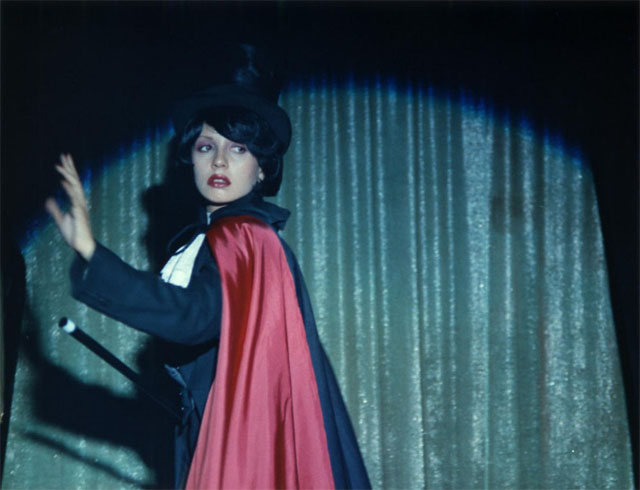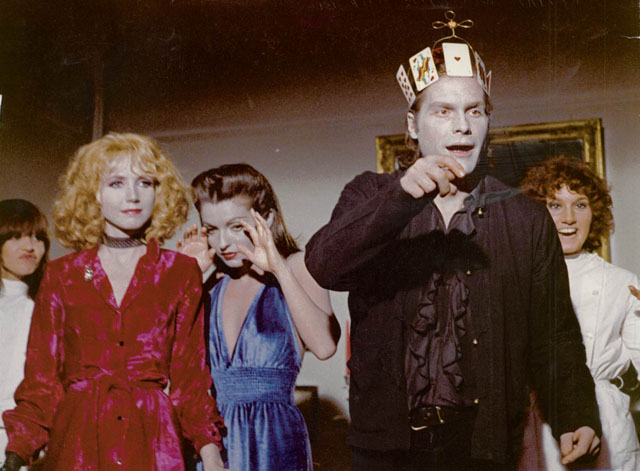“Godard once declared that ‘the history of cinema is the history of boys photographing girls,'” begins Melissa Anderson in the Voice. “Jacques Rivette, JLG’s New Wave confrere, upended that maxim with one of his first masterworks: Céline and Julie Go Boating (1974), a film about two female friends on an adventure and an act of spectacular collaboration between the director and his four main actresses, who all shaped the script.” Those actresses would be Juliet Berto, “playing magician Céline and Dominique Labourier as carrot-topped librarian Julie” and “Bulle Ogier (a frequent performer in Rivette’s films) and Marie-France Pisier as two women vying for the attention of a widowed man (Barbet Schroeder, Céline and Julie‘s producer).”
“Dense with codes and conspiracies, Mr Rivette’s films enlist characters and viewers alike in a mutual quest, a search for meaning or even for the story itself,” writes Dennis Lim in the New York Times. “Often there are mysteries to be solved: the provenance of a piece of music in Paris Belongs to Us (1961), the identity of a birth mother in Up Down Fragile (1995). Sometimes the engagement with story takes the form of a theatrical rehearsal: characters try to stage a Racine play in L’Amour Fou (1969), a Pirandello one in Va Savoir (2001). Céline and Julie unites these two modes.” Céline and Julie “become detectives when they stumble into a haunted house where a Gothic melodrama is unfolding in an eternal loop…. When the heroines finally step into the mansion together, the movie becomes a backstage farce, complete with audience applause and curtain calls. This ‘other house,’ like many of the privileged spaces in Mr Rivette’s films, is literally a stage…. While stage-bound settings are typically anti-cinematic, Mr Rivette’s closed worlds are arenas for transformation, places where re-enacted fictions can affect actors or viewers like a virus or a spell. In his most recent film, the melancholic Around a Small Mountain (2009), a character grandiloquently calls its stage—the single ring of a family-run traveling circus—’the most dangerous place on earth, but also where everything is possible.'”
“What’s magical about Céline and Julie is the way it conjures up so many earlier movies (Feuillade‘s serials, Duck Soup, Last Year at Marienbad, Band of Outsiders, Vera Chytilova’s Daisies, to name a few) while seeming completely sui generis,” writes J. Hoberman at Artinfo. “At the same time, Céline and Julie seems to have cast its spell on such disparate subsequent films as Irma Vep, Mulholland Drive, In the City of Sylvia, and especially Madonna’s most respectable vehicle, Desperately Seeking Susan. It seems to have always been with us but, like any cult film, Céline and Julie required time to find its audience. Hailed by its devoted early champion Jonathan Rosenbaum in both Sight and Sound and Film Comment, Céline and Julie had its US premiere at the 1974 New York Film Festival (along with Rivette’s even longer Out One/Spectre), then waited over three years for a commercial release.”
Hoberman then recalls that New Yorker Films opened Céline and Julie once more in 1978, when it “was reviewed for the Voice by its neophyte third-stringer, moi: ‘The quintessential French movie of the past 15 years… an original and entertaining metaphor for film-watching and, perhaps, film history.’ Decades later, that history is unthinkable without Rivette’s glorious intervention.”
Yesterday, Jonathan Rosenbaum republished his review for the Autumn 1974 issue of Sight & Sound, briefly mentioning Armond White‘s ridiculously off-the-wall swipe at him in his own review for CityArts, a piece that’s sent rumbles and grumbles across Twitter and Facebook over the past 24 hours or so. For another historical overview of Céline and Julie‘s reception over the decades, see Alt Screen‘s excellent roundup.
“In many ways the French New Wave’s phantom outlaw, Rivette has crafted his own sphere over the decades, a haunted metropolis dripping with undecipherables, intuited connections, senseless but contagious suspicions, etc.,” writes Michael Atkinson for the L, “and Céline and Julie is the springiest, zestiest tour of that city, a heroic dream in which there is no ‘reality’—a characterization that could almost define the film as a staged documentary about cinema, if we wanted to settle on one way of looking, and we don’t. Stirring and infectious, Céline and Julie is almost an accident, an amateurish, whimsical epic that is only and entirely ‘about’ the peculiarly, almost frighteningly delicious act of watching it, and if you let it it could change everything, least of all how you think about movies.”
More from Glenn Kenny, who pitches an amusing idea for an update, Joseph Jon Lanthier (going long for Slant, 4/4) and Keith Uhlich (Time Out New York, 5/5). Céline and Julie Go Boating is playing at New York’s Film Forum for one week starting today.
For news and tips throughout the day every day, follow @KeyframeDaily on Twitter and/or the RSS feed.





